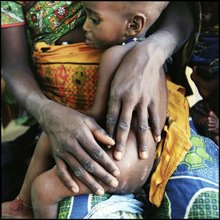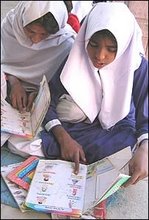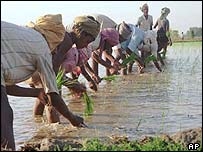PREAMBLE: The World Development Report 2008 (reference link below) calls for greater investment in agriculture in developing countries. This annual World Bank report warns that the sector must be placed at the center of the development agenda if goals of halving extreme poverty and hunger by 2015 are to be realized.
o While 75% of the world’s poor live in rural areas in developing countries, a mere 4% of official development assistance goes to agriculture.
o In Sub-Saharan Africa, a region heavily reliant on agriculture for overall growth, public spending for farming is also only 4% of total government spending and the sector is still taxed at relatively high levels.
o GDP growth originating in agriculture is about four times more effective in raising incomes of extremely poor people than GDP growth originating outside the sector.
Said World Bank Group President Robert B. Zoellick: “At the global level, countries must deliver on vital reforms such as cutting distorting subsidies and opening markets, while civil society groups, especially farmer organizations, need more say in setting the agricultural agenda.”
In this issue we focus on Malawi as a Case Study of the role of new subsidies to enhance agricultural production, despite decades of donor proscription not to subsidize, and take note of a World Trade Organization investigation into the use by the United States of truly massive trade-distorting farm subsidies in violation of international commerce rules.
Reference : World Development Report 2008: Agriculture for Development. http://econ.worldbank.org/WBSITE/EXTERNAL/EXTDEC/EXTRESEARCH/EXTWDRS/EXTWDR2008/0,,contentMDK:21410054~menuPK:3149676~pagePK:64167689~piPK:64167673~theSitePK:2795143,00.html
Case Study - ENDING FAMINE IN MALAWI
After a disastrous corn harvest in 2005, almost 40% of Malawi’s 13 million people needed emergency food aid. Move forward to 2007, and Malawi is selling more corn to the UN’s World Food Programe than any other country in southern Africa. Farmers explain the extraordinary turnaround with one word: fertilizer.
Over the past 20 years, the World Bank and some rich nations Malawi depends on for aid have periodically pressed this small, landlocked country to adhere to free market policies and cut back or eliminate fertilizer subsidies, even as the USA and Europe extensively subsidized their own farmers. But after the 2005 harvest, the worst in a decade, Bingu wa Mutharika, Malawi’s newly elected president, decided to follow what the West practiced, not what it preached, reinstating and deepening fertilizer subsidies.
The country’s successful use of subsidies is contributing to a broader reappraisal of the crucial role of agriculture in alleviating poverty in Africa and the pivotal importance of public investments in the basics of farm economies: fertilizer, improved seed, education, credit and agricultural research. Malawi’s leaders long favored fertilizer subsidies, but reluctantly acceded to donor prescriptions, often shaped by foreign-aid fashions in Washington, that featured faith in private markets and antipathy to public intervention.
In a withering evaluation of the World Bank’s record on African agriculture, the bank’s own internal watchdog concluded in October not only that removal of subsidies had led to exorbitant fertilizer prices in African nations, but that the bank itself often failed to recognize that improving Africa’s declining soil quality was essential to lifting food production.
In Malawi, deep fertilizer subsidies and lesser ones for seed, abetted by good rains, helped farmers produce record-breaking corn harvests in 2006 and 2007. An independent evaluation, financed by the USA and the UK, found that the subsidy program accounted for a large share of this year’s increase in corn production. The harvest also helped the poor by lowering food prices and increasing wages for farm workers.
Malawi’s determination to heavily subsidize fertilizer and the payoff in increased production are beginning to change donor attitudes, say economists who have studied Malawi’s experience. The UK (DFID) contributed $8 million to the subsidy program last year. Bernabé Sánchez, an economist with the agency in Malawi, estimated the extra corn produced because of the $74 million subsidy was worth $120 million to $140 million. The US, which has shipped $147 million worth of American food to Malawi as emergency relief since 2002, but only $53 million to help Malawi grow its own food, has not provided any financial support for the subsidy program, except for helping pay for the evaluation of it. Over the years, the USAID has focused on promoting the role of the private sector in delivering fertilizer and seed, and saw subsidies as undermining that effort. But Alan Eastham, the US ambassador to Malawi, said in a recent interview that the subsidy program had worked “pretty well,” though it displaced some commercial fertilizer sales. And the World Bank now sometimes supports the temporary use of subsidies aimed at the poor and carried out in a way that fosters private markets.
In Malawi, bank officials now support Malawi’s policy, though they criticize the government for not having a strategy to eventually end the subsidies, and... say there is still a lot of room for improvement in how the subsidy is carried out. “The issue is, let’s do a better job of it,” said David Rohrbach, a senior agricultural economist at the bank. Though donors are ambivalent, Malawi’s farmers have embraced the subsidies. And the government moved this year to give its people a more direct hand in their distribution.
Source: Adapted from the article by Celia Dugger. Ending Famine, Simply by Ignoring the Experts. New York Times Dec 2, 2007 http://www.nytimes.com/2007/12/02/world/africa/02malawi.html
WORLD TRADE ORGANIZATION INVESTIGATION INTO US SUBSIDIES
GENEVA (AP) — The WTO has opened an investigation into whether the US was violating international commerce rules that limited subsidies to American farmers, three days after the US Senate approved a $286 billion farm bill. Brazil and Canada, frustrated by US resistance to cutting back on subsidies, asked the WTO to condemn Washgton for exceeding permitted levels of what it called trade-distorting handouts to American producers of crops like corn, cotton, rice, soybean and wheat. The panel is expected to issue a first ruling in 2008. The dispute system often takes years before a final decision is reached, but can force countries to change their legislation or face billions of dollars in retaliatory sanctions. The battle over farm subsidies could become a landmark dispute for the WTO because Brazil’s complaint includes payments for ethanol production. The trade body has largely steered clear of energy issues in its 12-year history.
Source: Bradley S. Klapper. Associated Press. December 18, 2007
FROM a Great Canadian and World Statesman
"A great gulf... has... opened between man's material advance and his social and moral progress, a gulf in which he may one day be lost if it is not closed or narrowed..."
Lester B Pearson
http://nobelprize.org/nobel_prizes/peace/laureates/1957/pearson-lecture.html
Tuesday, 15 January 2008
WORLD DEVELOPMENT CALLS FOR INVESTMENT IN AGRICULTURE 2008
Labels:
agriculture,
Brazil,
canada,
Case Study,
DFID,
Europe,
farm subsidies,
fertilizer,
investigation,
Malawi,
Mutharika,
Sub-Saharan Africa,
UK,
USA,
USAID,
World Bank,
World Food Program,
WTO,
Zoellick
INSPIRATIONAL WELCOME ............................... from T.S.Eliot's "Little Gidding"
If you came this way From the place you would come from... It would be the same at the end of the journey...
If you came, not knowing what you came for, It would be the same... And what you thought you came for Is only a shell, a husk of meaning... From which the purpose breaks only when it is fulfilled If at all.


























